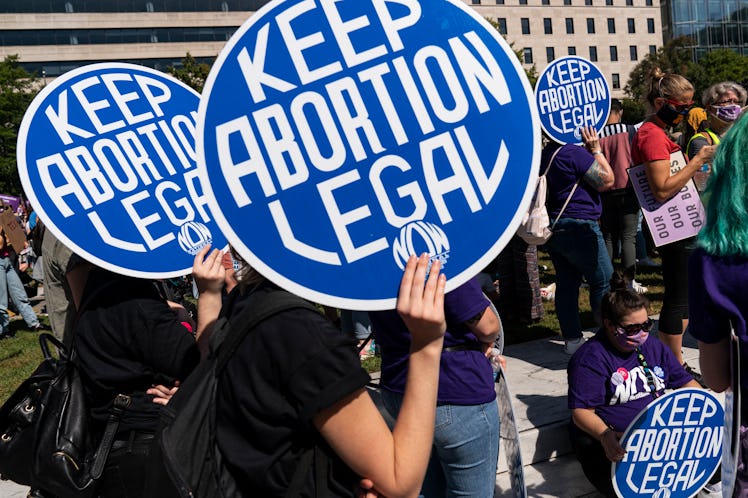
A Court Blocked Texas' Abortion Law — So, Here's What Happens Now
There are a lot more moves to come in this fight.
As the fight for reproductive rights continues to rage on in Texas, people all over the country are celebrating this victory. On Oct. 7, a federal judge in the U.S. District Court for the Western District of Texas, ruled Senate Bill 8 (SB8), the state’s near-total ban on abortion, unconstitutional. With the law now blocked from taking effect, the U.S. Supreme Court is poised to weigh in on the matter. So here's everything you need to know about what happens now, after Texas' abortion law was blocked.
“From the moment S.B. 8 went into effect, women have been unlawfully prevented from exercising control over their own lives in ways that are protected by the Constitution,” Robert L. Pitman, a federal district court judge in Austin, wrote in his 113-page opinion. Pitman sharply criticized the law, which was intentionally drafted to be difficult to challenge in court by delegating enforcement to private individuals — allowing individuals to sue anyone who performs, aids, or abets a ban-violating abortion for a “bounty” reward of at least $10,000. “This court will not sanction one more day of this offensive deprivation of such an important right,” Pitman added.
However, the the fight isn’t over. Texas almost immediately moved to override Pitman’s decision by filing an appeal with the Fifth Circuit Court of Appeals (also known as one of the nation’s most conservative appellate courts). And if Pitman’s decision is overruled, there are caveats: While SB8 is indeed barred from being enforced, the way the law is structured still allows private citizens to sue ban violators “retroactively for any abortions they provide while it is blocked,” per The New York Times. This means that until and unless SB8 is struck down for good by the Supreme Court, abortion care providers, clinics, and anyone who’s helped someone obtain an abortion are in a dangerous legal environment.
People all over the United States are concerned the conservative-majority Supreme Court will move to uphold Texas’ restrictive abortion law, along with dozens of other copycat laws across the country. It’s entirely possible: In early September, the court refused to block SB8 from taking effect in a 5-4 decision, ruling in a single paragraph citing the law’s unprecedented structure. “The state has represented that neither it nor its executive employees possess the authority to enforce the Texas law either directly or indirectly,” the unsigned majority opinion stated, referring to SB8’s clause allowing private citizens to enforce the law. “In reaching this conclusion, we stress that we do not purport to resolve definitively any jurisdictional or substantive claim in the applicants’ lawsuit.”
The dissenting opinions from other Supreme Court justices were harsh. “The Court’s failure to act rewards tactics designed to avoid judicial review and inflicts significant harm on the applicants and on women seeking abortions in Texas,” wrote Justice Sonia Sotomayor in her dissent. “In effect, the Texas Legislature has deputized the State’s citizens as bounty hunters, offering them cash prizes for civilly prosecuting their neighbors’ medical procedures.”
There’s far more to come concerning the legal fate of reproductive rights. In December, the Supreme Court will hold their first hearing on Mississippi’s Dobbs v. Jackson Women's Health Organization, a make-or-break case that could set the legal stage for overturning Roe v. Wade. In this case, the court will decide whether or not all state laws banning pre-viability abortions are unconstitutional, including Texas’ SB8.
But while reproductive rights hang in the balance, advocates are still working to ensure abortion care remains accessible. “Everyone should be able to get abortion care when they need it — without stigma or harassment. These extremists are relentless, but so are we,” said Kamyon Conner, executive director of the Texas Equal Access (TEA) Fund, in an Oct. 7 statement to Elite Daily. “We will continue to fight back against these politically motivated efforts to control our bodies and lives, and we will continue our work to ensure that all people in Texas who need abortions can get them.”